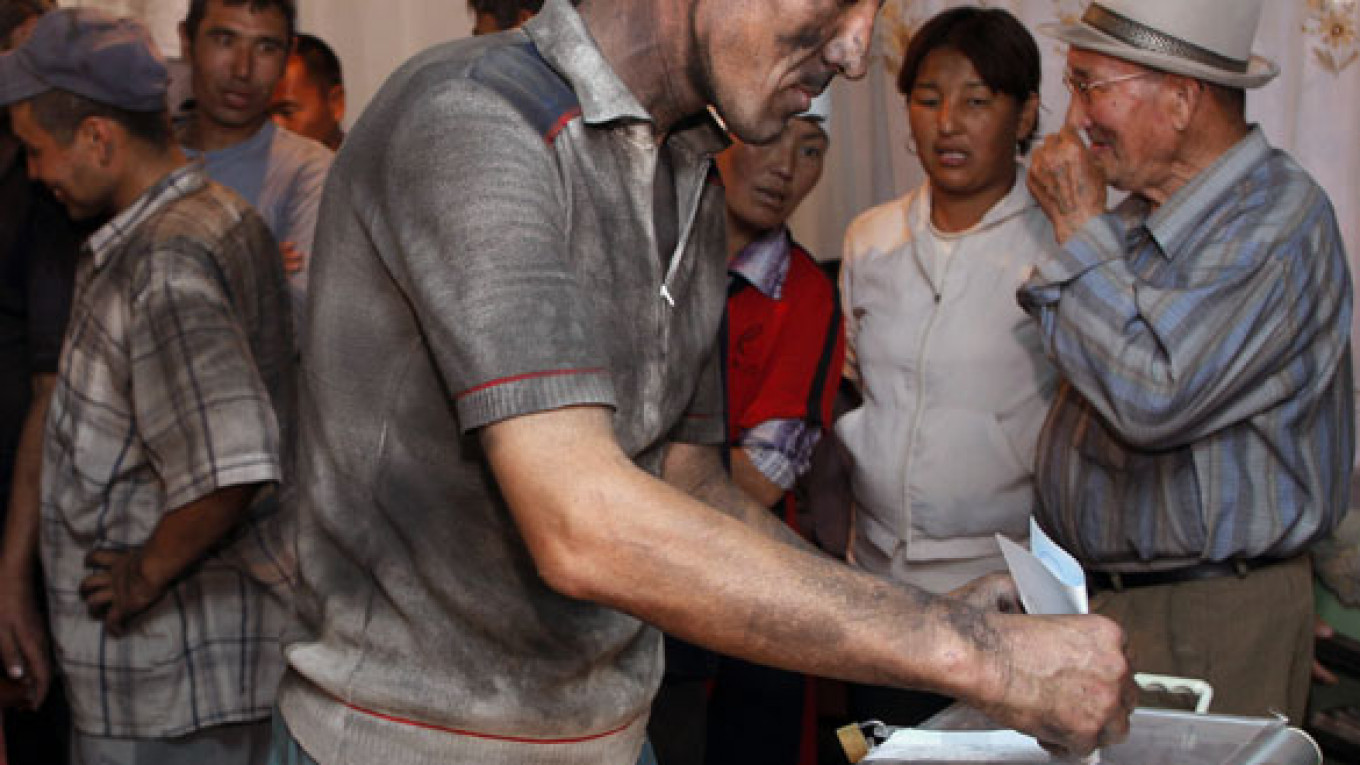BISHKEK, Kyrgyzstan — President Dmitry Medvedev warned that Kyrgyzstan could collapse and that a vote aimed at establishing parliamentary democracy could allow extremists to take power.
Kyrgyzstan voted over the weekend to create Central Asia's first parliamentary democracy, referendum results showed Monday, only two weeks after an explosion of ethnic bloodshed killed hundreds.
Medvedev said Kyrgyzstan was Russia's strategic partner. But his remarks, just hours after Kyrgyz leader Roza Otunbayeva said the referendum placed her country on the path to democracy, contrasted with the strong support Kyrgyzstan's new government received from Moscow after a revolt in April.
"I do not really understand how a parliamentary republic would look and work in Kyrgyzstan," Medvedev said Sunday after a Group of 20 summit in Toronto.
"Will this not lead to a chain of eternal problems — to reshuffles in parliament, to the rise to power of this or that political group, to authority being passed constantly from one hand to another, and, finally, will this not help those with extremist views to power?" Medvedev said. "In its current state, there are a host of scenarios for Kyrgyzstan, including the most unpleasant scenario — going up to the collapse of the state."
At least 294 people, and possibly hundreds more, died this month in violence between ethnic Kyrgyz and Uzbeks in southern Kyrgyzstan. Russia has refused repeated requests from Bishkek to send peacekeepers to halt the violence.
Keneshbek Dushebayev, head of Kyrgyzstan's National Security Service, has said extremists could have played a role in the violence and that the country was a weak link that could be exploited by terrorist groups.
Security analysts say violence is unlikely to hand gains to militant Islamists because the authorities are on alert.
This opinion was echoed by a member of Hizb ut-Tahrir, or Party of Liberation, a movement that says it uses only peaceful methods to achieve its goal of establishing a worldwide caliphate — a theocratic Muslim state.
"We are not planning to use this chaos to increase our influence," said Abdullah, a tire salesman and senior Hizb ut-Tahrir member in Osh, epicenter of this month's violence.
"This can only backfire because then we would be accused of orchestrating all of this, and that would lead to more bloodshed," he said. He declined to give his last name.
Official results showed that with almost all of Sunday's votes counted, 90.6 percent of voters backed the new constitution, paving the way for parliamentary elections in October.
Only 8 percent voted against, according to preliminary data from all but one of the country’s 2,319 polling stations, the Central Election Commission said on its web site. Turnout was 69 percent.
The commission's head, Akylbek Sariyev, said final results would be known in two to three days, after all ballot papers had been collected. Results have been relayed in electronic form from regional centers to the capital, Bishkek.
The Organization for Security and Cooperation in Europe said the referendum was transparent and that the high voter turnout signaled the resilience of Kyrgyz citizens.
Its election monitoring arm, the Office for Democratic Institutions and Human Rights, said it had observed some flaws that would require improvement ahead of parliamentary elections scheduled for October and every five years thereafter.
Under the new constitution, Otunbayeva will be acting president until the end of 2011, and future presidents would serve single, six-year terms.
The United States and Russia say they would support a strong government to prevent the turmoil spreading throughout Central Asia, a region bordering Afghanistan in which all countries have until now been run by authoritarian presidents.
"We hope that this is an effective step toward stable, democratic governance. We welcome the calm, orderly process, but await final polling results," a U.S. State Department spokesman said Sunday as the first results came in.
Russia, the United States and China are the major powers in Central Asia, and Medvedev said he had briefed world leaders at meetings in Toronto about the situation in Kyrgyzstan.
A Message from The Moscow Times:
Dear readers,
We are facing unprecedented challenges. Russia's Prosecutor General's Office has designated The Moscow Times as an "undesirable" organization, criminalizing our work and putting our staff at risk of prosecution. This follows our earlier unjust labeling as a "foreign agent."
These actions are direct attempts to silence independent journalism in Russia. The authorities claim our work "discredits the decisions of the Russian leadership." We see things differently: we strive to provide accurate, unbiased reporting on Russia.
We, the journalists of The Moscow Times, refuse to be silenced. But to continue our work, we need your help.
Your support, no matter how small, makes a world of difference. If you can, please support us monthly starting from just $2. It's quick to set up, and every contribution makes a significant impact.
By supporting The Moscow Times, you're defending open, independent journalism in the face of repression. Thank you for standing with us.
Remind me later.


